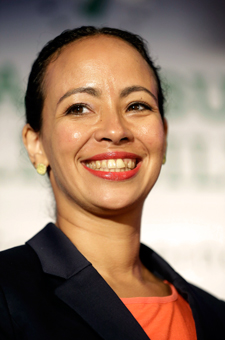Respect for Healthcare Workers and Science Are the Best Ways to Stop Ebola
November 5, 2014
By Milly Silva
(Milly Silva, the former Democratic candidate for Lieutenant Governor, is an Executive Vice President of 1199SEIU United Healthcare Workers East, representing more than 400,000 healthcare workers in New Jersey, New York, Massachusetts, Maryland, Florida and Washington, D.C.)
As the number of confirmed Ebola cases in West Africa grows beyond 10,000 and as the first cases appear in the US, many fear the rise of a global pandemic. In order to protect New Jersey and the nation overall, it is vital that officials respond to the crisis in ways that are scientifically justified, effective, ethical, and safe. (Yet as we’ve witnessed over the past week, many elected leaders around the nation appear to be acting more out of political expediency rather than sound, informed judgment. I would eliminate this sentence as we don’t want to be seen as implicitly criticizing Cuomo).
Failing to heed the advice of health experts when it comes to decisions regarding the quarantine and monitoring of suspected Ebola cases arriving in the United States is dangerously counterproductive and ultimately undermines the global effort to control the disease.
New Jersey must do everything possible to support our nation’s healthcare workers who are risking their lives by volunteering to treat Ebola patients at the virus’s epicenters in Guinea, Liberia, and Sierra Leone. These are men and women whose work is necessary to keeping Ebola from spreading in those countries and elsewhere, including the US; it is essential that we not stigmatize them on their return or create burdensome restrictions that will discourage others from volunteering overseas.
As experts from the World Health Organization, US Centers for Disease Control, Doctors Without Borders, and many other organizations have stressed repeatedly, combating the disease at its source is the very best way of preventing outbreaks here. We live in a deeply interconnected world and we cannot protect ourselves from Ebola simply by trying to wall ourselves off from an entire (I think “sub” should be eliminated)continent.
Earlier this week, Doctors Without Borders, which has sent hundreds of personnel to the hardest hit regions in West Africa, warned that mandatory quarantines “will present significant operational disruptions…and lead to an overall shortage of desperately needed health workers, precisely when the Ebola outbreak is as out of control as ever.“ It is critical that we not take unnecessary actions that impede their urgent work.
On the one hand, Governor Christie has rightly spoken out against stoking public hysteria and misconceptions about Ebola. On the other hand, his actions over the past week and his disparaging and brash attitude towards epidemiologist Kaci Hickox have done exactly that. His outrageously crass statement that “when she has time to reflect, she’ll understand” the quarantine shows a shocking lack of respect towards Ms. Hickox’s own medical expertise and that of the broader medical community which overwhelmingly opposed her detention.
The Governor has since backtracked on his decision to keep Ms. Hickox confined to a makeshift tent at University Hospital in Newark and allowed her to return to Maine where she will be quarantined at home, but the underlying problem remains—our state has no clear or medically-grounded approach to handling potential Ebola cases, of which we will likely see more in the future.
Health professionals need to be the guiding force in establishing the rules and procedures for dealing with Ebola, not politicians who lack medical training and are in no position to override the judgment of those in the fields of healthcare and disease prevention.
The best thing that Governor Christie can do to protect New Jersey families is to follow the advice of experts of infectious diseases, but it is unclear what, if any, consultation he sought prior to establishing mandatory quarantines.
Dismissing the concerns of the medical community in favor of taking actions that he considers to be “common sense” but have no scientific basis undermines public trust in our health system and only contributes to confusion and overreaction. Already, we are witnessing a growing sense of panic that, if not tempered by thoughtful and truthful reassurance, may begin to (removed “share”) parallel the unjustified hysteria and stigma that existed during the early years of the AIDS epidemic.
Above all else, our response to Ebola needs to be governed by decades of scientific research and by ensuring that our healthcare workers, both in West Africa and here at home, receive the very best training, staffing, safety equipment, and logistical support available. The men and women on the frontlines fighting Ebola represent the very best of the American ethos of courage and compassion for humanity—and they need to be, honored, protected, and treated with respect so we can bring this disease under control.
- See more at: http://www.1199seiu.org/_respect_for_healthcare_workers_and_science_are_the_best_ways_to_stop_ebola#sthash.h3rbTgbx.dpuf


